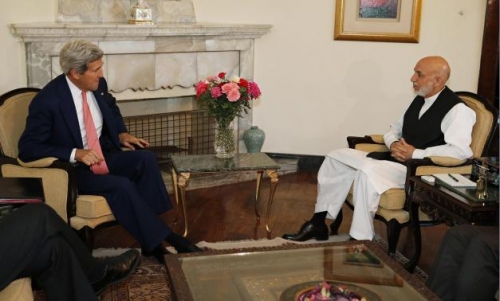Disputed Afghan election to be recounted in full
U.S. State Secretary John Kerry convinced Afghanistan's feuding presidential candidates on Saturday to agree to a total recount of last month's presidential election, which has threatened to split the country along ethnic lines.
 U.S. Secretary of State John Kerry meets Afghanistan's incumbent President Hamid Karzai
(R) at the presidential palace in Kabul July 12,
2014.
U.S. Secretary of State John Kerry meets Afghanistan's incumbent President Hamid Karzai
(R) at the presidential palace in Kabul July 12,
2014.
After two days of intense talks between Kerry, Abdullah Abdullah and Ashraf Ghani, all parties agreed that the best way out of the acrimonious and protracted deadlock was to delay the inauguration and recount all the ballots from scratch.
Preliminary results from the run-off vote on June 14 put Ghani, a former World Bank official, well ahead but Abdullah rejected the result, claiming widespread fraud and calling the outcome a "coup" against the Afghan people.
In a joint news conference with Kerry held just before midnight, the two rivals agreed to abide by the outcome of a U.N.-supervised recount.
The recount was scheduled to begin within 24 hours, but was likely to take several weeks, meaning that a presidential inauguration scheduled for Aug. 2 will have to be postponed.
The dispute has raised concerns about a smooth transition of power in Afghanistan just as U.S.-led troops are leaving after 12 years of fighting the Taliban. The stakes are high for the United States. Washington hopes to settle the dispute quickly so it can sign a security pact with Afghanistan allowing a contingent of U.S. troops to stay in the country beyond this year.
Unlike incumbent Hamid Karzai, both Abdullah and Ghani have both promised to sign the deal promptly, but the standoff over the vote has delayed the process.
After his own talks with Kerry, Karzai said he welcomed the initiative and hoped the full audit would start quickly.
Abdullah's support is mainly in the north, among the Tajik minority, while Ghani is supported by Pashtun tribes in the east and south.
Observers have warned that if the dispute is not resolved quickly, Afghanistan could split along ethnic lines, with further violence likely.
Reuters

